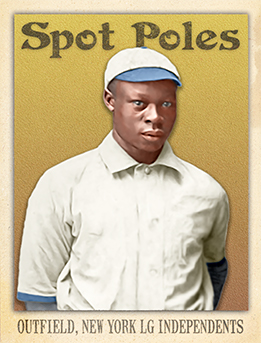- Card series: Diamond Heads '15
- City: New York
- Team: Lincoln Giants
- League: Independent
Spottswood Poles (1889-1962) was ranked by renowned athlete and singer Paul Robeson as one of the four most talented black athletes of the first half of the 20th century, along with Jesse Owens, Joe Louis and Jack Johnson. Fast company for a fleet-footed outfielder who was once timed in a sub-ten-second 100 yard dash. Spot was raised in Harrisburg, PA and came up with the sports clubs for colored kids. His talent led him to debut with Sol White’s Philadelphia Giants in 1909. He was a hit. And could he hit: averaging well over .400 for four seasons. He followed his mentor to New York’s Lincoln Giants and remained with various NY clubs until returning to Philly and Ed Bolden’s Hilldale Club. Some highlights of his time with the Lincolns included defeating Rube Foster’s powerhouse Chicago American Giants and proving his mettle against all competition, including getting three straight hits off Grover Cleveland Alexander in one of the exhibition games played against major league teams. Spot enlisted with the 369th Infantry Regiment, dubbed by their German foes the Hellfighter Regiment for their implacable defense (never giving up a trench or a yard of battlefield), and earned five battle stars and a Purple Heart. The 369th was the first African American unit in WWI and was assigned to the French forces who knew them as “The Men of Bronze”. They called themselves the Harlem Hellfighters. After the war, Poles knocked around before settling back with Hilldale.
- Playing in Cuban and Negro ball, Poles is cited in some sources as averaging over .400 lifetime, a stat not corroborated by Baseball Encyclopedia. Suffice to say, he was one of the best hitters of his or any era
- John McGraw pegged Spot as one of four black players he’d have put in the majors, with Pop Lloyd, Smokey Joe Williams and Cannonball Dick Redding
- The decorated war hero is buried in Arlington National Cemetery with his wife Bertha
